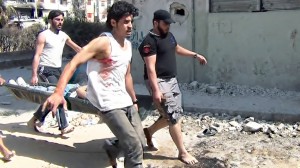You have no items in your cart. Want to get some nice things?
Go shoppingThe Return to Homs offers a glimpse of history through a personal struggle of identity and sacrifice.

Source: Flickr
The Syrian civil war has been well documented over the past three years: the media paints a violent, and fragmented picture, one with a complicated timeline. The western world has observed but always with a sense of disconnection. Who are these people, and what are their stories? The Return to Homs, directed by Talal Derki, is the very important missing link, shedding light on a sensitive subject. This is eye-opening and daring filmmaking, and will take audiences in to the heart of a conflict without a foreseeable end.
Spanning over three years, we bear witness to the peaceful beginnings of a movement protesting against the regime of Bashar al-Assad and their shift towards violence against the military sent to quell them. Our point of view is that of Abdul Basset, goalkeeper of the Syrian national football team and demonstration leader of the rebels. Basset and his brothers-in-arms’ ideology is forced to adapt as the violence escalates and they find themselves with few alternatives; principle streets in the city of Homs are under the ever watchful eye of unforgiving snipers and tanks patrol everywhere in between, cascading shell after shell without regard for civilians or buildings. The rebels of Homs fight for its liberation but the odds are stacked severely against them. Soon, it is a battle for simple survival as Homs becomes a casualty of its own war. Ravaged buildings become the only safe means of travel across a city that is unrecognisable, even to its inhabitants. Pressed on all sides, the rebels have burrowed tunnels under its streets, a desperate but necessary means of escape. Led by Basset, we are privy to uncensored horrors and harsh realities, the futility of which begins to take its toll on Basset casualty by casualty.
This isn’t traditional documentary film-making and The Return to Homs has the potential to frustrate audiences with that point alone. We are thrust unashamedly in to the heart of this conflict without much context and left to piece together the story as an outsider undoubtedly would. But it works: this film provides a privileged insight and has no apologies to make. Talal Derki lets the raw footage and the characters speak for themselves, a cry of injustice to the outside world. We are not given much time to get to know these characters around Basset, for events happen so frantically we barely have the time just to catch up with them. That seems to be one of the questions this film is trying to ask: how do we define ourselves in the absence of our daily routines? And in the face of extreme adversity, how much does identity matter?
Keep in mind, this is a documentary very much from one perspective. The regime is faceless and omnipresent, but there is most definitely a side the filmmakers have purposely kept from the audience, either to bolster the rebels’ cause or perhaps to protect them from a potential political backlash. During scenes in which the two sides clash, we don’t actually see a rebel fire a gun in the enemy’s direction. Neither is there someone to lay bare the exact cause of the conflict in order to give the audience a sense of choice. But this doesn’t feel like propaganda, indeed the film is quiet in the way of any prompts.
The ninety minute duration sometimes lags beneath a repetitive narrative, and the second half serves to reinforce the messages of the first. The shaky handheld camerawork plays to the chaos of the situation, but it is easy to lose ourselves amidst it all and the scenes in which Basset visits his family are a welcome reprieve for us as well as him. However, one cannot help but admire the lengths to which the director went in order to get his footage; he followed a wanted man in to the very heart of danger for an extensive period of time, demonstrating as clear a dedication to the art of film as you will ever witness in cinema. As Basset and his comrades face mounting defeats and their support begins to dwindle, one wonders whether there was ever a good time to part ways with these men. Inevitably, the film ends unexpectedly, and the title marks the climax of sorts that will see the militia enter a new chapter in their ongoing struggle against a seemingly indominatable enemy.
What The Return to Homs ultimately offers is a glimpse of history through the eyes of youth, a personal struggle of identity and sacrifice. Where it may frustrate some, others will hopefully appreciate what Talal Derki has offered his audience. You will walk away with a greater understanding of this oft discussed crisis and a deeper respect for those embroiled within it. Can you imagine yourself in their situation? Be grateful you’ll never have to experience anything like it.

About Jake Munn
Jake Munn tutors media at an alternative learning provision in Hertfordshire by day and directs short and corporate films by night. He fits writing fiction in between. Favourite film - The Good, The Bad and The Ugly.




